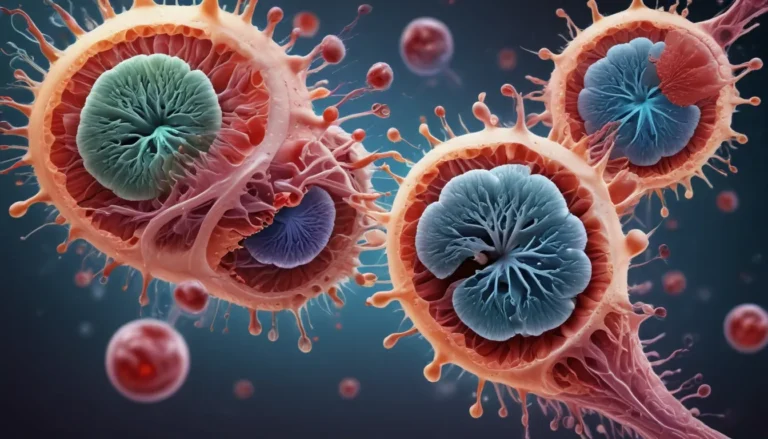A Note About Images: The images used in our articles are for illustration purposes only and may not exactly match the content. They are meant to engage readers, but the text should be relied upon for accurate information.
Are you ready to embark on a journey through the remarkable world of the CRISPR-Cas system? This groundbreaking technology has revolutionized the field of molecular biology, offering endless possibilities for genetic engineering and genome editing. From combating genetic diseases to creating disease-resistant crops, the CRISPR-Cas system continues to amaze scientists and researchers worldwide. Let’s explore 19 surprising facts about the vast applications of this innovative tool and discover how it is reshaping the future of science and technology.
Unleashing the Power of CRISPR-Cas System
The CRISPR-Cas system acts as a genetic superhero, tackling genetic diseases, enhancing agriculture, and even potentially eradicating malaria. It serves as a genetic Swiss army knife with boundless potential to improve our world. Scientists wield this tool like genetic detectives, unraveling mysteries and finding solutions for diseases, environmental challenges, and organ shortages. It’s like a genetic treasure map guiding us towards a healthier and more sustainable future.
The Revolutionary Genetic Tool
The CRISPR-Cas system stands out as a revolutionary genetic tool, offering precise and efficient gene-editing capabilities that have transformed the field of biology. Its applications span across various industries, promising innovative solutions to complex challenges.
Origins in Bacteria
Initially observed in bacteria as a defense mechanism against viral infections, the CRISPR-Cas system sparked curiosity and led to groundbreaking advancements in genetic engineering. What started as a natural adaptation has evolved into a powerful tool with endless possibilities.
Treating Genetic Diseases
By targeting and modifying specific genes, CRISPR-Cas holds the potential to cure genetic disorders such as sickle cell anemia, cystic fibrosis, and muscular dystrophy. This technology offers hope for individuals suffering from these debilitating conditions.
Agriculture Advancements
CRISPR-Cas plays a vital role in agriculture by creating disease-resistant crops that can withstand environmental stresses and pests. This leads to improved crop yields, enhanced food security, and a more sustainable agricultural ecosystem.
Fighting Malaria
Scientists are exploring the use of CRISPR-Cas to genetically modify mosquitoes, making them incapable of transmitting malaria parasites. This groundbreaking approach holds the promise of eradicating malaria, a significant global health concern.
Cancer Treatment Innovations
In the realm of cancer treatment, researchers are investigating how CRISPR-Cas can target and destroy cancer cells with remarkable precision. This personalized treatment approach offers new avenues for combating this devastating disease.
Antibiotic Development
CRISPR-Cas technology is aiding in the discovery and development of novel antibiotics to address the growing issue of antibiotic resistance. This innovation is crucial in combating infectious diseases and safeguarding public health.
Environmental Conservation Solutions
The CRISPR-Cas system can be leveraged to modify organisms and enhance their ability to restore damaged ecosystems. From cleaning up oil spills to reducing pollution, this technology offers sustainable solutions for environmental conservation.
Biofuel Production Potential
Engineered microorganisms created with CRISPR-Cas have the capability to produce biofuels efficiently, paving the way for sustainable and renewable energy sources. This innovation holds tremendous promise for reducing our reliance on fossil fuels.
Disease-Resistant Livestock
By enabling targeted gene editing in animals, CRISPR-Cas contributes to the creation of disease-resistant livestock. This advancement reduces the need for antibiotics in animal agriculture and improves overall animal welfare.
Non-Invasive Diagnostics
Researchers are exploring the use of CRISPR-Cas as a non-invasive diagnostic tool to detect infectious diseases, genetic mutations, and cancer markers in a simple and cost-effective manner. This technology has the potential to revolutionize medical diagnostics.
Endangered Species Conservation
CRISPR-Cas can aid in preserving genetic diversity by editing the genomes of endangered species, potentially saving them from extinction. This application highlights the importance of genetic conservation in biodiversity management.
HIV/AIDS Research
In the fight against HIV/AIDS, researchers are investigating how the CRISPR-Cas system can eliminate the virus from infected individuals, offering hope for a long-lasting cure. This research represents a significant step forward in tackling this global health crisis.
Targeted Pest Control
CRISPR-Cas provides a targeted and environmentally friendly solution to control invasive species by modifying their genes. This innovative approach offers a sustainable method for managing pest populations.
Development of Disease-Resistant Crops
Scientists harness the power of CRISPR-Cas to create crops that are resistant to devastating plant diseases, reducing the need for harmful pesticides. This advancement promotes sustainable agriculture practices and enhances food security.
Efficient Research Practices
The CRISPR-Cas system has revolutionized genetic research by enabling experiments with greater efficiency, accuracy, and affordability. This innovative tool streamlines research processes, leading to faster discoveries and advancements in various fields.
Organ Transplantation Solutions
Researchers are exploring the possibility of using CRISPR-Cas to modify animal organs for transplantation, addressing the critical shortage of human donor organs. This technology holds promise for revolutionizing organ transplantation practices.
Neurodegenerative Disease Treatments
In the realm of neurodegenerative diseases, CRISPR-Cas offers hope for developing treatments for conditions such as Alzheimer’s and Parkinson’s. By targeting and modifying genes associated with these diseases, researchers aim to improve patient outcomes and quality of life.
Production of Bio-Based Materials
Researchers are exploring CRISPR-Cas as a tool to engineer microorganisms capable of producing sustainable and eco-friendly materials. This innovation reduces our dependence on fossil fuels and promotes the development of green technologies.
Conclusion
The CRISPR-Cas system’s applications represent a new frontier in genetic engineering and gene editing, offering unprecedented opportunities for scientific innovation. From disease treatment to environmental conservation, this powerful tool has the potential to revolutionize various industries and shape the future of biotechnology.
The journey into the realm of the CRISPR-Cas system applications unveils a world of possibilities and promising advancements. As researchers continue to harness the power of this technology, we can expect further breakthroughs that will transform our understanding of genetics and biology.
FAQs
-
What is the CRISPR-Cas system?
The CRISPR-Cas system is a revolutionary gene-editing tool derived from a defense mechanism found in bacteria. It enables precise editing of genetic material, opening up new possibilities for genetic engineering. -
What are some applications of the CRISPR-Cas system?
The CRISPR-Cas system’s applications include disease treatment, crop improvement, gene therapy, and the creation of genetically modified organisms. -
How does the CRISPR-Cas system work?
The CRISPR-Cas system utilizes RNA molecules to guide a protein, Cas9, to specific locations on DNA. Cas9 then cuts the DNA, allowing for precise gene editing. -
What are the benefits of using the CRISPR-Cas system?
The CRISPR-Cas system offers precise and efficient gene-editing capabilities, leading to advancements in medicine, agriculture, and biotechnology. It presents opportunities for targeted disease treatment, increased crop yields, and the development of new therapies. -
Are there ethical concerns surrounding the CRISPR-Cas system?
Yes, the use of the CRISPR-Cas system raises ethical concerns, particularly regarding human germline editing and the potential for unintended consequences. Ethical guidelines and regulations are crucial to ensure responsible use of this technology. -
What is the future of the CRISPR-Cas system?
The CRISPR-Cas system holds immense potential for the future, with researchers continuously exploring new applications and refining techniques. This technology is poised to revolutionize fields such as medicine, agriculture, and biotechnology.
Explore the wonders of the CRISPR-Cas system and delve into the realm of genetic innovation. Join the scientific community in unlocking the mysteries of genetics and shaping a brighter future through the power of molecular biology. Let’s embrace the endless possibilities that CRISPR-Cas offers and embark on a journey towards a healthier and more sustainable world.






